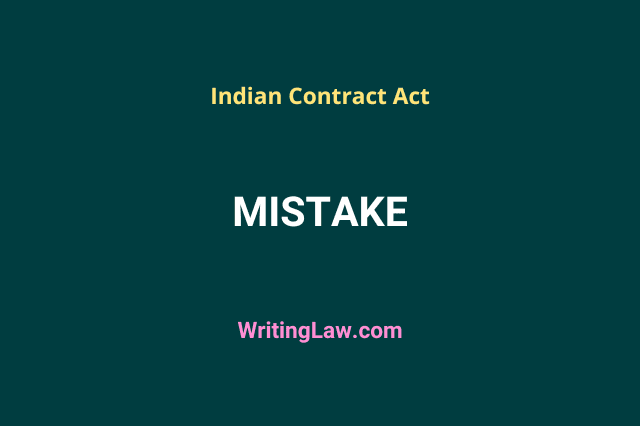
Contract law operates on the principle that agreements are formed with mutual understanding and consent. However, mistakes can occur, casting a shadow on the validity of contractual agreements.
The topic “mistake in contract law” explores the intricacies of these errors and their legal implications. Mistakes, whether genuine, mutual, or unilateral, can have serious consequences in contractual relationships.
In this law note, we talk about the types of mistakes, their effect on contract validity, and the remedies available to parties.
Definition of Mistake
In the context of the Indian Contract Act, a mistake refers to an erroneous belief held by one or both parties at the time of contract formation.
For example, suppose Party A agrees to sell their vintage car to Party B, believing it to be a rare collector’s item. In that case, and Party B agrees to buy it, believing it to be a regular model, a mutual mistake arises. Both parties are under the impression that the car has a unique value.
However, it later becomes clear that the car is less valuable than initially believed. In such cases, the concept of the mistake comes into play.
The relevant sections dealing with mistakes in the Indian Contract Act are sections 20 to 22.
- Section 20 pertains to when both parties are under a mistake of fact necessary to make the contract valid.
- Section 21 addresses mistakes of law, and section 22 covers cases where only one party is under a mistake.
These sections explain the legal consequences of contract mistakes and provide a framework for addressing them.
Types of Mistakes
Mistakes in contract law are broadly categorized into two main types:
- Mistake of Law
- Mistake of Fact
Let me explain both.
1. Mistake of Law
A mistake of law occurs when one or both parties to a contract make an erroneous (wrong/incorrect) belief or misunderstanding about the legal principles, regulations, or consequences related to their agreement. In other words, it involves a misconception about how the law applies to a specific situation. Unlike mistakes of fact, which pertain to factual elements, mistakes of law concern the legal framework in which the contract operates.
Effect on Contract: Generally, a mistake of law does not provide a strong legal basis to invalidate a contract. The principle is rooted in the expectation that parties entering into contracts know the law and its implications. Ignorance of the law is not considered an acceptable excuse for voiding a contract. This principle is captured by the Latin maxim “ignorantia juris non excusat,” which means ignorance of the law is no excuse.
Exceptions: However, there are certain exceptions where the courts might consider a mistake of the law:
- Complex or Unclear Laws: If the law in question is exceptionally complex, unclear, or not easily accessible, courts might be more understanding of a mistake. This could apply when interpreting tax laws, regulations of a specialized industry, or recent changes in the law.
- Reliance on Authorities: If a party relied on an authoritative source, such as a legal expert or government agency, and their advice led to a mistake of law, this might be considered.
- Change in Law After Agreement: A significant change in the law after the contract is formed might impact the contract’s enforceability.
Example: Imagine Party A signs a contract to sell a piece of land to Party B. However, Party A mistakenly believes that a specific zoning regulation allows for commercial development on the land. Subsequently, Party B discovers that the zoning regulation has changed, and the land can only be used for residential purposes. Despite Party A’s mistake about the zoning law, it’s unlikely that this mistake of law would provide sufficient grounds to void the contract.
2. Mistake of Fact
A mistake of fact occurs when one or both parties to a contract hold an incorrect belief about a material and essential element of the contract. This mistake involves a misunderstanding or lack of knowledge regarding factual circumstances or details crucial to the agreement. Unlike a mistake of law, which concerns the legal framework, a mistake of fact revolves around the factual aspects of the contract.
Effect on Contract: The effect of a mistake of fact depends on the nature and significance of the mistake. If the mistake is substantial and fundamental to the contract’s formation, it might render the contract void or voidable. A key principle of contract law is that parties must have a genuine meeting of minds, or a “consensus ad idem,” for a contract to be valid. If a mistake of fact prevents this consensus, the contract’s validity might be called into question.
Categories of Mistake of Fact: Mistakes of fact can be further categorized into three types:
- Common Mistake: A mutual mistake of fact occurs when both parties share a mistaken belief about a fundamental aspect of the contract. The mistake relates to a crucial fact that forms the basis of the agreement. If this fact were known to be different, the parties might not have entered into the contract at all. In cases of common mistakes, the contract can be rendered void.
- Mutual Mistake: This refers to a situation where both parties have different understandings of the same fact. In other words, they are mistaken, but each party’s mistake complements the other’s. In such cases, either party may void the contract if the mistake concerns a material aspect of the contract.
- Unilateral Mistake: In this scenario, only one party is mistaken about a fact related to the contract. This can be further categorized into two types:
- (a) A mistake by One Party About Terms: If one party makes an error about a term or condition in the contract, it usually does not affect its validity. However, the contract might have been avoidable if the other party knew or should have known about the mistake and took advantage of it.
- (b) A mistake by One Party About Identity: If a party enters a contract believing they are dealing with a certain individual or entity, but it turns out they are not, the mistaken party may void the contract.
Available Remedies When a Contract Is Affected by a Mistake
When a contract is affected by a mistake, several potential remedies are available, depending on the nature and significance of the mistake. Here are six common remedies that can be sought.
1. Rescission
Rescission involves the cancellation or termination of the contract due to a mistake. This remedy aims to restore the parties to their original positions as if the contract never existed. Rescission is typically available for voidable contracts due to a material mistake of fact. The injured party can request the contract’s cancellation and seek to be placed back in their position before the contract was formed.
2. Rectification
Rectification is a remedy used when a written contract does not accurately reflect the parties’ true intention due to a mistake. It allows the court to modify the contract’s written terms to align with the parties’ true agreement. Rectification aims to correct the contract’s wording to accurately represent what the parties intended.
3. Specific Performance
If the contract is not voidable but enforceable, and the mistake significantly affects the contract’s performance, the party can seek specific performance. Despite the mistake, this remedy compels the breaching party to fulfil their obligations under the contract as agreed upon. Specific performance is typically available for contracts involving unique or valuable assets.
4. Damages
In cases where the mistake does not render the contract void or voidable but leads to financial loss, the injured party might seek damages. Damages are monetary compensation awarded to the injured party to cover the losses from the mistake. The damages aim to put the injured party in the position they would have been in had the mistake not occurred.
5. Restitution
Restitution is a remedy designed to restore any benefits one party might have received under the contract due to the mistake. This remedy ensures that unjust enrichment does not occur due to the mistake. It requires the party to return any benefits received from the other party.
6. The Doctrine of Equitable Estoppel
In some cases, a party might be prevented from asserting a mistake as a defence if their conduct or representations led the other party to reasonably rely on certain beliefs. The doctrine of equitable estoppel can prevent a party from claiming a mistake when their actions suggest otherwise.
Conclusion
The intricacies of mistakes in contract law highlight the critical need for precision and clarity in agreements. Whether rooted in factual misunderstandings or legal misinterpretations, mistakes can significantly impact the validity and enforceability of contracts.
Parties should be vigilant in ensuring that their agreements accurately reflect their intentions and seek legal counsel when uncertainties arise. The array of remedies available, including rescission, rectification, specific performance, and restitution, provides avenues for addressing the consequences of mistakes.
Ultimately, a solid understanding of mistakes in contracts empowers parties to navigate contractual relationships with greater insight and foresight, fostering a more secure and reliable legal landscape.
- Mistake Under the Indian Contract Act – Law Note - 20th July 2025
- Limitation on Granting Injunctions Under Specific Relief Act - 4th June 2024
- Techniques for Proper Case Management in Civil Courts in India - 3rd June 2024






